Communicating Christ in a Multicultural World
1. Introduction
"When Jesus came to the region of Caesarea Philippi, he asked his disciples, 'Who do people say that the Son of Man is?'
'Well,' they replied, 'some say John the Baptist, some say Elijah, and others say Jeremiah or one of the other prophets.'
Then he asked them, 'But who do you say I am?' Simon Peter answered, 'You are the Messiah, the Son of the living God'.
Jesus replied, 'You are blessed, Simon son of John, because my Father in heaven has revealed this to you. You did not learn this from any human being.
Now I say to you that you are Peter (which means 'rock'), and upon this rock I will build my church, and all the powers of hell will not conquer it.
And I will give you the keys of the Kingdom of Heaven. Whatever you forbid on earth will be forbidden in heaven, and whatever you permit on earth will be permitted in heaven.'
Then he sternly warned the disciples not to tell anyone that he was the Messiah."
(Matthew 16:13-20)
Lesson Objectives
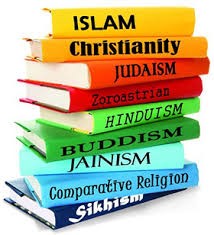 This introductory topic overview discusses the concept of "religion", as a personal and communal expression in a multicultural world. It describes a number of ways "religion" can be approached and understood; this is essential if we are to be able to navigate multiple faith systems and communicate Christ (the person and the message), with the Holy Spirit's enabling.
This introductory topic overview discusses the concept of "religion", as a personal and communal expression in a multicultural world. It describes a number of ways "religion" can be approached and understood; this is essential if we are to be able to navigate multiple faith systems and communicate Christ (the person and the message), with the Holy Spirit's enabling.
Religion is never far from the news
- The Bishop of Stockholm proposes that a church in her diocese remove all signs of the cross and put up markings showing the direction to Mecca for the benefit of Muslim worshippers. Eva Brunne, the world's first openly lesbian (Church of Sweden) bishop, recently (2016) made the suggestion to welcome those of other faiths.
- Inspired by the Islamic State of Iraq and the Levant (ISIL, or ISIS), a Salafi jihadist militant group that adheres to an Islamic fundamentalist, Wahhabi doctrine of Sunni Islam, terrorists kill 130 people at targeted locations in Paris.
- Organisations opposed to Christian values continue to target traditional values about marriage, Christmas and other beliefs in the West, to remove religion from public life.
The kaleidoscope of faith and religious practice in a shrinking world is complex. Christians need to re-think some traditional approaches about how to reach the world with the Gospel.
Why Study Other Religions?
Like Jesus at Caesarea (home of the worship of the god Pan for centuries), we live in a "pluralistic" society. So also did the apostles planting the Christian church in the New Testament Gentile world in which the Greco-Roman pantheon predominated. The Jerusalem Church was focused on preaching to Jews or Jewish proselytes, but the pace of world evangelism quickly geared up to reaching all of humanity, not just the Jews.
The coming of the wise men to Jesus illustrated early on that He was send to the entire world. As "world Christians" we need to understand society, not ignore it, cf Acts 1 7:28b.
- A Buddhist temple, Hindu temple, Hare Krishna centre, Orthodox churches, a mosque, synagogue, Kingdom Hall, & host of Roman Catholic and Protestant churches are located with 15 minutes drive of Unity College in Canberra
- Some Australian Christians resent (or are suspicious of) multiculturalism and the entry of people of alien "faiths". Others see an opportunity for evangelism/mission outreach/training of those whom God and world migration bring into our midst.
Everyone has a worldview; most have an innate "religious" hunger (whether or not they admit it).
Even influential social scientists (such as Freud, Jung, Levi Strauss, Tylor) acknowledge this search (albeit interpreting it differently).
"I would argue that religion comes from a desire to get to the questions of where do we come from and how shall we live," (Rushdie) said at the opening of Columbia University's new Institute for Religion, Culture and Public Life. "And I would say I don't need religion to answer those questions. Regarding origins, I think you can say [they are all wrong.] The world was not created in six days and God rested on the seventh. It was not created in the churning of a giant pot. Or the sparks unleashed by the udders of a giant cow against the boulders of a gigantic chasm. And regarding 'how shall we live,' I don't want answers that come from some priest." (Salman Rushdie)
http://content.time.com/time/arts/article/0,8599,1857759,00.html
Rushdie has also written about the "religion-shaped vacuum" in society Midnight's Children. We simply cannot get away from religion.
As followers of Jesus Christ, we are called to share the Gospel in our globalised world. Christianity is a missionary faith (it is not alone in this respect, eg Islam is a missionary religion). The Bible reflects the interaction between Christianity and other worldviews. However, approaching men and women of other religious persuasions is not just an intellectual task. We have been given a "ministry of reconciliation" and a mandate to bring them back into right relationship with God (2 Corinthians 5:14-21)
To open their eyes and to turn them from darkness to light, and/from the power of Satan to God, so that they may receive forgiveness of sins and a place among them who are sanctified by faith in (Jesus Christ) (Acts 26:/8, Ephesians 6:12; Colossians 1:13: 2 Corinthians 4:4/Luke 4:18)
We will only be effective in getting past "religious" barriers that people construct if we actually understand what they believe, and make the Gospel relevant to them. Consider:
- when someone says "I believe in God", what do they mean?
- people who believe in reincarnation may not understand the urgency of repentance and preparation for judgment
- people who do not accept the Bible as the Word of God (or their own "sacred texts") at face value, are often prepared to quote it as a philosophy
- most cults employ the same terms we use (eg God, rebirth, baptism, fellowship, salvation, Christ as the Son of God), but they often have very different meanings; the differences need to be recognised and addressed convincingly
- people who belong to societies where communal decisions are made (as distinct from "individualistic" Western societies) need to see the community as a whole embracing the Gospel (Acts I l :21; 16:31).
In this age of easy travel it is logical to assume we will all be faced with opportunities to spend part of our lives ministering in a "mission" context. We need to extend our understanding of what religious expression means and how it measures up in terms of our own beliefs.
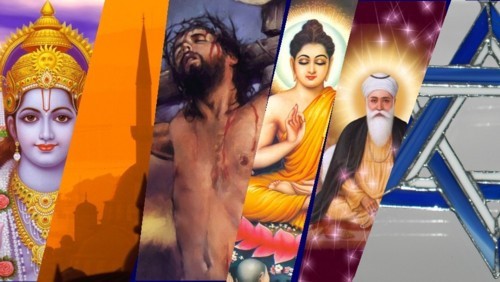
Foundations
- This course reflects a Christian worldview. This is not the same as "equal" or arms length treatment of the subject in secular educational institutions or publications (eg university-level comparative religion courses, or all-faith religion programs). We believe the Bible is the Word of God, Jesus Christ is the Son of God and Saviour who came into a world of sin, to redeem men and women. Our response needs to be Biblically-based and clear. It helps to know what we believe before we start.
- Christ and the Gospel are unique; "comparative religion" (a term often used in training circles) is a matter of contrasting equals. This is not a buffet, like a "Good God Guide". Christ is the only way to God.
- The world has physical and spiritual dimensions. We believe in God, angels, Satan. evil spirits, demons, etc. The world is under the influence of Satan (l John 5: 19). Understanding the world's religions involves recognising that demonic activity underpins them (see I Corinthians 10:19-20) and overcoming "strongholds" at variance with (or in opposition to) the Divine Revelation (2 Corinthians 10:3-6). This is not an intellectual engagement, but a power encounter (l Corinthians 2:4-5).
- Religion and culture are often inseparable. In much of the world, it is not possible to analyse the "meaning" of religion without appreciating cultural nuances. We will explore this aspect in Week Two.
- The Gospel of Jesus Christ applies to all men and women, regardless of race. culture, history, etc. God loved the world so much that He provided a salvation applicable to the whole of mankind (John 3:16). However, local "expressions" of the church will vary, within Biblical guidelines. The bottom-line Biblical expectation is that people need to turn from false religion to faith in Christ for salvation - Acts 17:29-31.
This is a big subject- too large for a single semester. It is intended to create an appetite and establish some good foundations. Students need to continue exploring.
Christians need to put themselves in the shoes of others when sharing the Gospel; the message and imagery can be unintelligible when presented without adequate explanation to people with little or no prior understanding of Christian teaching.
- "They'd been elated to leave. 'Always we had to say "Thank you, Jesus", to a picture of a white man' ". (Boo, K, Behind the Beautiful Forevers, Random House, New York, 2012, p. 207; depiction of Hindu girls relating their experiences while in a Christian mission in Mumbai.)
- "Here is the Hindu temple. Here is the Sikh temple. Here is the Christian temple" (commentary from a taxi driver to the writer during a drive through Delhi).
- "Are you justified?" "Are you sanctified?" (titles of Christian tracts used in a Christian open air meeting in Brisbane, observed by the writer; the language of the title and text was alien to most of the recipients).
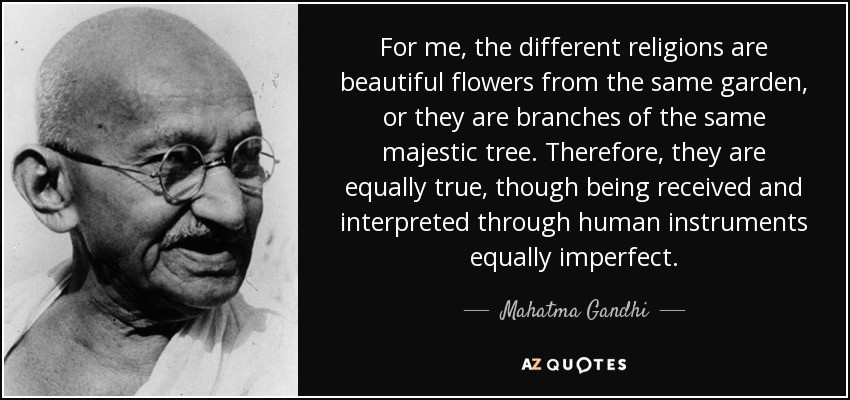
A common view
The Meaning of "Religion"
The most accurate definition of the Latin word is "religio", lit. "to bind oneself back, to connect or join". Religion connects the present life with the future, supernatural with natural, transcendent with here and now, humans and gods. Those gods can be Greek Roman, Jewish or Australian.

How Religions Can Be Approached and Compared
Anthropologically - religion is universal. Anthropology is the study of human behaviour, in particular human cultures. In cultural terms, religion helps to unite people in a shared experience and explanation of life and the environment; a system or pattern of living. Anthropologists emphasise religion within evolution, particularly "uncivilised" or "undeveloped" societies. Tylor saw religion as a "belief in spiritual beings". Malinowski (Trobrainds; a functionalist) believed that magic provided a psychological support in the face of peoples' fears. Latter anthropologists (eg Claude Levi Strauss, a structuralist) emphasised religion as an expression of ideas, values and beliefs of a people group. According to Clifford Geertz, religion is a "symbolic system" (be the symbol a cross, crescent, sacred book or norms) "to help humankind cope with the chaotic forces of life that render people impotent in the analytic, emotional and moral sense". Today anthropologists define "religion" as the worship of supernatural forces that give shape and meaning to the universe (as seen by the participant observer).
Sociologically - religion provides a shared meaning system, a socially agreed way of looking at the world; giving individuals a sense of purpose. Emile Durkheim studied totemism along Australian Aborigines. He believed religion was genuine, however its foundation is in society, eg a "moral community". Used words like "gods" to describe social structures and issues. In 'The Protestant Ethic & the Spirit of Capitalism Durkheim showed how predestination/ Calvinism led people to work hard as part of their calling. (and laid a foundation for "rugged individualism".) Paul Tillich (1886-1965) saw religion as being "a system of beliefs and practices directed at the ultimate", eg when we consider the enormity of the universe, the power of natural forces or the mystery of life we pose "why" questions: "who am I, why am I here, where am I going?" However, religion need not necessarily include a supernatural being.
Psychologically - Sigmund Freud (1856-1939) wished to describe how the power of the mind, grounded in sexual energy (libido) ascribed to a god-like figure that originated in a child's relationship with his father, described religion in sexual terms. People create gods on the basis of their needs, then ascribe reality to them. In "The Future of Illusion" Freud referred to religion as a "universal, obsessional neurosis". William James taught that religion is man's way of accepting himself and his life conditions. Abraham Maslow (1908-1970) stressed that religion is a positive force, helping to produce an integrated personality. Some psychologists have reduced the function of religion to reducing anxiety, channelling deeply felt emotion, providing comfort, sanctioning human conduct, enhancing oral tradition through rituals and, fostering group solidarity (including a feeling of belonging, eg "the chosen people", support groups, church attendance, communion, pilgrimages, a sense of community, eg 5 x daily prayers toward Mecca).
Phenomenologically - Aims to classify phenomena of religion, eg objects, rituals, doctrines, feelings, ie we "know" about peoples' realities by what we observe. While we cannot see what goes on in people's hearts, we can observe how man behaves in relation to belief. "Myth" is a sacred narrative that expresses the unobservable realities, of religious belief in terms of observable phenomena. Relatively recent approach because the first settlers in Australia believed the Aboriginal people did not have religion (visible forms or signs), that we now know to have been an incorrect assumption. Ninian Smart (Scottish writer and university educator, a was a pioneer in the field of secular religious studies, 1927-2001) saw religion as having six dimensions: ritual, mythological, doctrinal, ethical, social and experimental - a practical way for a phenomenologist to study and describe any religion or sect in human experience. He said, "We must penetrate beyond what is publicly observable.
Historically - religion has shaped history. Marx opposed religion in historical economic terms. He argued that religion is simply an opiate, an anaesthetic for worldly life, to take peoples' minds off injustices. He further argued that religion has its function but that it does not bring happiness; for that a revolution is necessary. Marx wrote, "Religion is the sigh of the oppressed creature, the sentiment of a heartless world, and the soul of soulless conditions. It is the opium of the people"
Comparative Linguistics - Friedrich Max Muller (1823-1900), was engaged in the translation of the ancient texts of India; led him from the science of language to the study of mythology, eg the names of gods (Gk: theos; Latin: Deus; Sanskrit: deva all relate to the idea of "brightness"). Language tells us a lot about how people construct belief.
Theologically or Missiologically - religion was not invented, evolved or discovered by mankind. From the beginning, man knew the Creator who had made him; from that time worshipped God, eventually through sacrifice (for forgiveness of sin). Man was originally monotheistic. Christian theologians believe the other positions are flawed because they (a) stand apart from divine relation and (b) are outside of the faith perspective.
Reading: Romans 1:16-32
The next article will continue to consider how religion is expressed in culture, with particular reference to the Australian context.
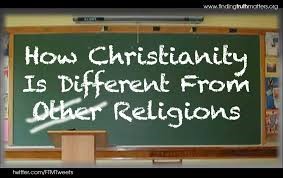
Simple and Complex Religious Systems
Simple religion: animism - spirit-fearing religions of many tribal peoples.
"Developed" religion usually comprises:
- ancient writings, which were sometimes regarded as "covenants", eg
- Vedic (Hindu) literature c. 1000 BC
- the Old Testament - Moses and the Prophets and other writers; the New Testament
- Gnostic texts
- Koran
- Baghavad Gita
- Book of Mormon, Pearl of Great Price
- Kabbala
- all of these contain (or claim to contain) revelations, stories, codified laws, histories, esoteric teachings, or secrets that (in many cases) only specialists can explain.
- organisational structures
- shamans > priesthoods (in time these become full-time, paid positions; usually male
- communities (ranging from Amish to Hare Krishna), societies, cliques, denominations
- hierarchies (eventually hereditary and exclusive), with distance between professionals (priests/intermediaries, sometimes controlling access to God) and non-professionals
- (ordinary people) = clergy and laity; strong authority structures (that's why political leaders kneeling before priests is significant)
- priestly/holy cities (Jerusalem, Mecca, Amritsar, Varanasi); religious governments (eg Calvin Geneva), theocracies (cf Taliban in Afghanistan, ISIS, Islamic Republic of Iran, Australian League of Rights), sacred anointings of leaders (eg Queen Elizabeth); state religions (eg Wahabi Islam in Saudi Arabia)
- calendars of special events, and histories, such as Christmas, Easter, saints days, Friday (Muslims), Shabbat (Jews), Sundays (most Christians), Ramadan, Hanukah, Thaipusam, Hungry Ghost Month, or Dewali
- life application
- ethics; moralism (Ten Commandments, Sermon on the Mount)
- codification of thought and practice
- salvation by right actions
- separation, sanctification (eg monasteries)
- legislation (eg Shariah law in Pakistan, Rushdoonie calling for a Christian state)
- worship, symbols, rites - salvation by ritual; liturgy; usually starts simply, then develops complexities around myths and obligations
- (presumed) monotheism of early Aryans > complex Hindu thought; as religion descended into pantheism > polytheism
- the three monotheistic religions (Judaism, Christianity & Islam) fiercely oppose polytheism. Even many polytheistic religions (Hinduism, tribal religions) have echoes of a single originating creator, a "high God", their place has been taken (or shared) by spirits and lesser gods. Gnosticism (cf demiurges) in the early NT period and other dualistic religions had hints of the same
- Abraham > OT Law
- totemism > temples (and temple complexes), idols, symbols, altars, private (then public) offerings (animal, then human) and sacraments (for thanksgiving, then to secure forgiveness and favour).

The Christian Perspective
Christians believe that there is an absolute difference between
- God and human beings (even though we are made in the likeness and image of God)
- grace and sin
- revelation and self-effort/legalism
- religion and relationship with the One God/religion
- serving God from love/fear/superstition
| Religion | Christian Faith |
|---|
| a man-made thing | based on divine revelation through Jesus Christ - Titus 2:1 1-14 |
| reaches upward in search of God/gods | grace reaches down |
| seeks to "earn" favour with God/gods/spirits | brings us freely into right relationship with the One True God through Christ - Ephesians 3:14-21; Colossians 1:20 |
| overloads with obligation | Christ brings new life and relationships, hope and the way to God that is not dependent on obligations or burdens- 2 Corinthians 7 |
| buries the truth in wood, stone, books, cultural traditions | proclaims Christ as the Truth, who came to earth as "God with us" - His "fullness in bodily form" - John 14:6; Colossians 2:8-10 |
| emphasises self-effort; produces fear of inadequacy | emphasises the totality and work of Christ, undeserved favour freely bestowed on us by God- Romans 8 |
| produces idolatry, self-righteousness, unbelief, self-centredness; hollowness, and divided nations, societies, families | produces hope, peace, reconciliation, freedom from fear, and love - Titus 3:7; Romans |
| by religion people attempt to justify and sanctify themselves before a capricious and arbitrary picture of God or gods | Christianity declares that Christ died all. the just for the that He might us to God I Peter 3:18 |
| there is no true religion | the only true relationship with God is through Christ - John 1:10-13; Ephesians 1:17-23 |
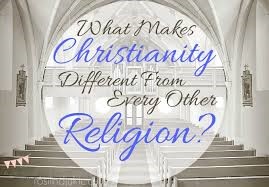
 This introductory topic overview discusses the concept of "religion", as a personal and communal expression in a multicultural world. It describes a number of ways "religion" can be approached and understood; this is essential if we are to be able to navigate multiple faith systems and communicate Christ (the person and the message), with the Holy Spirit's enabling.
This introductory topic overview discusses the concept of "religion", as a personal and communal expression in a multicultural world. It describes a number of ways "religion" can be approached and understood; this is essential if we are to be able to navigate multiple faith systems and communicate Christ (the person and the message), with the Holy Spirit's enabling.





